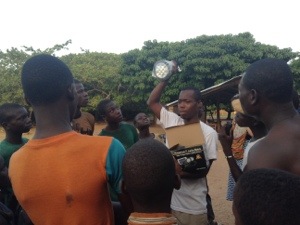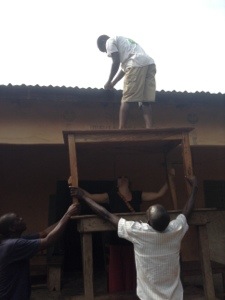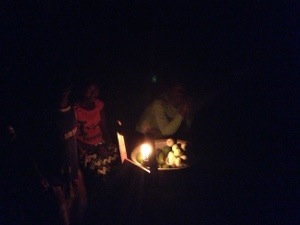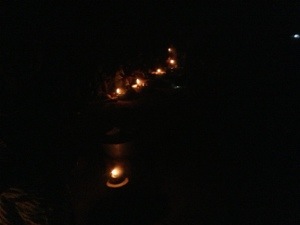Last Thursday, Solar Benin Energy went to Lahotan, a village about an hour away from Savalou, where SBE and Novi are based. Lahotan does nor have electricity, and relies on kerosene lamps, or generators powered by motor oil. Hervé Binazon, Novi’s program coordinator; Sophia Cioccia, another intern; and I all went to spread awareness about the availability of solar-powered energy alternatives. We spoke first with the CA (Chef d’Arrondissement) of the village, who had a solar light in his home brought from Europe. He was very receptive, and saw the need in his village. Hervé did most of the talking, in Mahi, the local language of Lahotan. The next stop was meeting with a collection of important people in the village, who were having a meeting that evening. On the way, though, we stopped to talk to some men who were playing dominos, the name of a game that looks a little like mancala. They got really excited about it too. When we got to the meeting, we all introduced ourselves in French, but Hervé spoke to them in Mahi about the product. At the end, however, they turned to me and had someone tell me in French, “thank you so much for bringing this product to us.” They continued to thank me, although I had done nothing, said nothing, and was merely an intern tagging along. Just because I was American like the product, I must be the one bringing the product, instead of the Beninese NGO I’m working for. This happened a few more times, and each time I found it very strange. I was told that I was a bridge between the foreign product and the people in the village, since consumers are very conservative, and my presence led credence to the product. It was a strange reality to be faced with.
The visit was very successful. Reaching the important people in the village is an important first step to reaching the rest of the village, since they spread the word. Some of the men we spoke to are religious leaders, which is a powerful resource because of the very religious nature of Benin. Churches will also be helpful for recruiting young people to act as information agents. Some people we talked to already wanted lights, so we ended up installing two systems. Below are some pictures of our trip:
Author: Idun Klakegg



